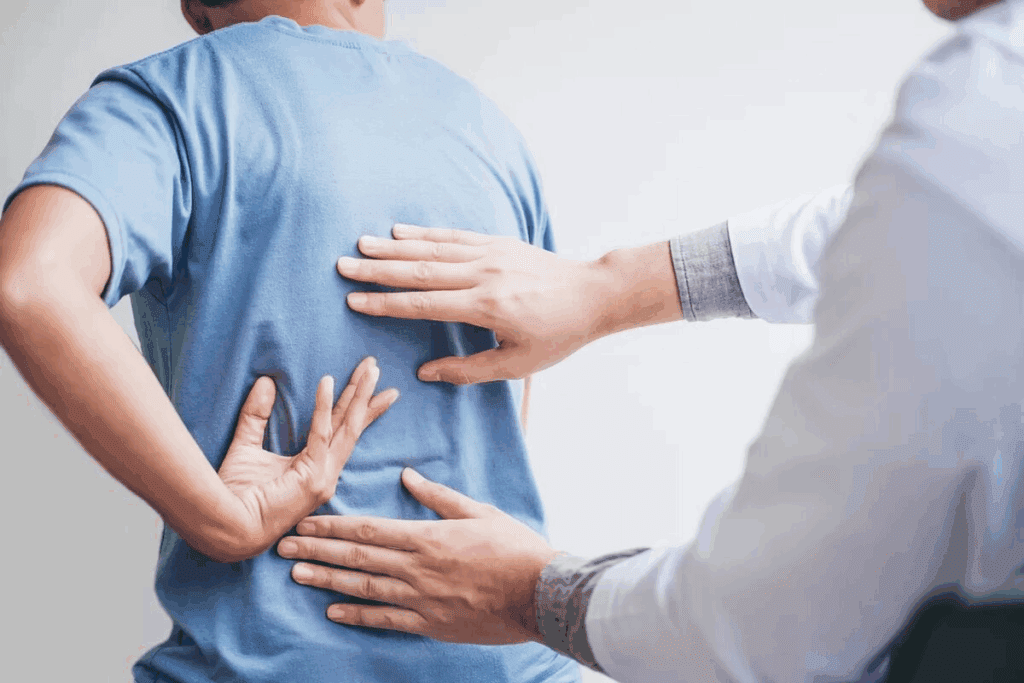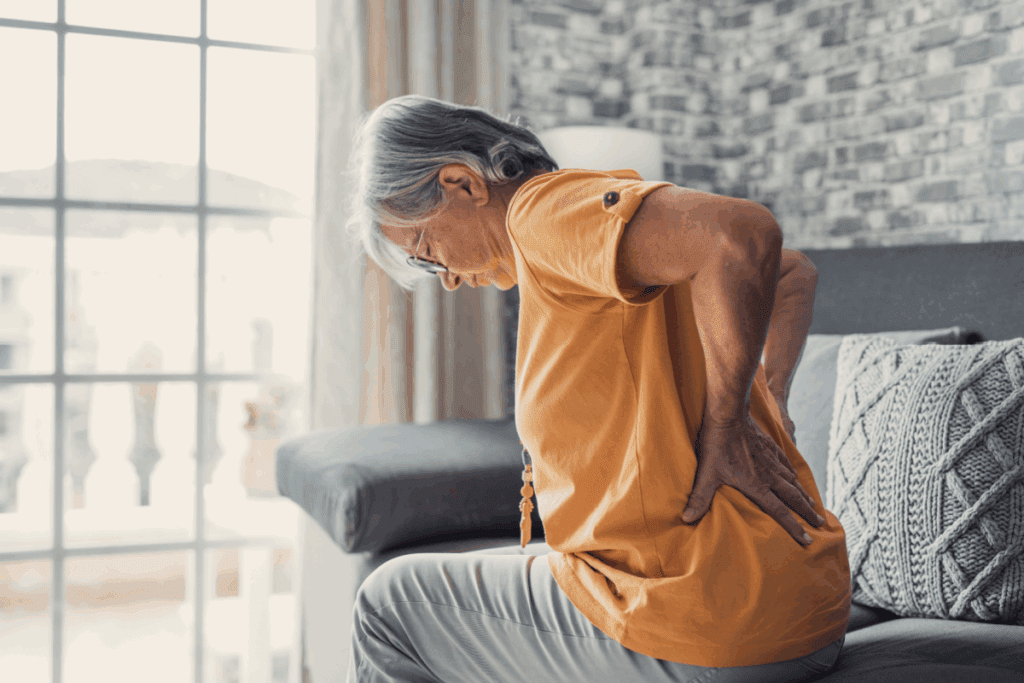
Millions of people worldwide suffer from kidney stones Kidney Scintigraphy: Uses & Diagnostic Valuekidney stones and constipation. They experience not only intense pain but also a range of gastrointestinal symptoms. The direct effects of kidney stones are well understood. But their indirect impact on bowel function is less commonly discussed.
We know that constipation and bloating can be just as debilitating as the pain from kidney stones. At Liv Hospital, we are committed to providing care that addresses the complex relationships between urinary and digestive health.
Kidney stones can indirectly cause constipation through altered eating habits and reduced fluid intake. Changes in bowel movements also play a role. Plus, certain medications used to manage kidney stone pain can contribute to gastrointestinal symptoms like bloating.
Key Takeaways
- Kidney stones can indirectly cause constipation and bloating.
- Altered eating habits and reduced fluid intake contribute to gastrointestinal symptoms.
- Certain medications for kidney stone pain can affect bowel function.
- Understanding the complex relationship between kidney stones and digestive health is key.
- Comprehensive care addressing both urinary and digestive health is essential.
Understanding Kidney Stones: An Overview

Kidney stones, or renal calculi, are hard deposits that form inside the kidneys. Their prevalence is rising. These stones can cause severe pain and are a significant health concern for many individuals.
What Are Kidney Stones?
Kidney stones are hard, crystalline masses that develop in the kidneys. They are typically made of materials such as calcium oxalate, calcium phosphate, uric acid, or struvite. The formation of these stones is often related to factors like dehydration, dietary habits, and genetic predisposition.
The size of kidney stones can vary significantly, ranging from as small as a grain of sand to as large as a golf ball. Larger stones can get stuck in the urinary tract, causing severe pain, nausea, and vomiting.
Types of Kidney Stones
There are several types of kidney stones, each with different compositions and causes.
- Calcium Stones: These are the most common type, often made of calcium oxalate.
- Uric Acid Stones: These form when there’s too much uric acid in the urine.
- Struvite Stones: These are associated with urinary tract infections.
- Cystine Stones: These are rare and usually occur in people with a genetic disorder.
Prevalence and Risk Factors
The prevalence of kidney stones has been increasing over the years. Certain risk factors contribute to the formation of kidney stones, including:
- Dehydration: Concentrated urine can lead to stone formation.
- Dietary Factors: A diet high in sodium, animal protein, and oxalate can increase the risk.
- Genetic Predisposition: Individuals with a family history are more likely to develop kidney stones.
- Obesity and Metabolic Syndrome: These conditions can increase the risk of developing kidney stones.
Understanding these risk factors is key for prevention and management. By addressing these factors, individuals can reduce their likelihood of developing kidney stones.
Kidney Stones and Constipation: The Direct Connection

Research shows kidney stones can indirectly cause constipation. Kidney stones mainly affect the urinary system. But, they can also impact bowel movements.
How Kidney Stones Affect Bowel Function
Kidney stones can change how we eat and drink. This can lead to constipation. Some pain medicines, like opioids, can also slow down bowel movements.
Pain from kidney stones can make us less active. This can cause constipation. The stress of having a kidney stone can also affect our digestion.
Statistical Evidence and Research Findings
Studies have looked at how kidney stones relate to constipation. They found a strong link between kidney stones and digestive problems.
| Study | Sample Size | Constipation Prevalence |
| Smith et al. (2020) | 500 | 35% |
| Johnson et al. (2019) | 300 | 28% |
| Williams et al. (2018) | 700 | 42% |
Patient Experiences
Patient stories offer insights into kidney stones’ effects on bowel function. Many report constipation during or after a stone episode.
For example, a patient might say,
“During my kidney stone episode, I experienced severe constipation, which was quite unexpected. The pain was so intense that I couldn’t eat or drink much, and I think that contributed to my constipation.”
These stories show how kidney stones, pain, and bowel function are connected. They stress the importance of treating both urinary and digestive symptoms.
Anatomical Relationship Between Kidneys and Digestive System
The kidneys and digestive system are closely linked. They are near each other and share nerve pathways. This connection helps explain why kidney stones can cause stomach problems like constipation and bloating.
Proximity of Organs and Nerve Pathways
The kidneys sit in the back of the abdomen, close to the colon’s lower parts. This close proximity means kidney stone issues can easily reach the bowel. Also, the nerves for the kidneys and digestive system are connected, leading to referred pain and other stomach symptoms.
The shared nerve pathways can make pain from kidney stones feel in other places, like the abdomen or groin. This is called referred pain. It happens because the nerves sending pain signals from the kidneys to the brain also carry signals from the digestive tract.
How Inflammation Spreads Between Systems
Inflammation from kidney stones can irritate the bowel, causing constipation. The kidneys and colon are close, allowing inflammation to spread. This affects the digestive system’s normal function.
Also, a kidney stone can cause inflammation in nearby tissues and organs, including the bowel. This inflammation can lead to symptoms like bloating, discomfort, and constipation.
Pain-Induced Digestive Changes
Kidney stones can really mess with our daily habits, like eating and drinking. When we’re dealing with a stone, our usual routines get disrupted. This can hurt our digestive health in big ways.
Altering Eating Habits
Kidney stone pain can make eating hard, leading to less appetite or avoiding certain foods. This can lead to not getting enough nutrients and worsen digestive problems like constipation. Some common changes include:
- Eating smaller, more frequent meals to manage discomfort
- Avoiding spicy or acidic foods that may irritate the digestive system
- Reducing intake of high-fiber foods due to concerns about exacerbating pain
These changes can make our diet low in important nutrients and fiber, causing constipation.
Reduced Fluid Intake and Dehydration
Some people might drink less water when they have a kidney stone to avoid pain or bathroom trips. But drinking less water can cause dehydration, which is bad for constipation. Dehydration makes stools harder and drier, making them harder to pass. It’s key to balance pain management with staying hydrated.
Impact on Physical Activity
Kidney stone pain can also make it hard to be active. Not moving much can slow down digestion, leading to constipation. While rest is needed, short walks can help stimulate bowel movements. It’s about finding a balance between rest and gentle movement for better digestion.
Understanding how kidney stone pain affects our habits can help us manage its impact on our digestive system. This knowledge helps us make better health choices during kidney stone episodes.
Medication Side Effects: Kidney Stone Treatments and Constipation
Medications are key in treating kidney stones to manage pain. But, they can also affect bowel function. The link between kidney stone treatment and constipation is complex, involving different medications and their side effects.
Pain Medications and Bowel Function
Pain meds, like opioids, are often used for kidney stone pain. Opioids can slow down bowel movements, causing constipation. This happens because opioids affect the gut’s opioid receptors, reducing intestinal movement.
While pain relief is vital, it’s also important to watch for gut side effects. Doctors might suggest laxatives or other treatments to help with constipation from opioid pain meds.
Calcium Channel Blockers
Calcium channel blockers are used to treat kidney stones by relaxing ureter muscles. They’re not usually linked to constipation. Yet, some people may get constipation or other gut symptoms from these drugs.
Other Medications That May Cause Constipation
Other meds for kidney stones or related issues can also cause constipation. For example, some anti-nausea drugs and calcium or aluminum supplements can slow bowel movements.
| Medication Type | Potential Effect on Bowel Function | Management Strategies |
| Opioid Pain Medications | Slows down bowel movements, causing constipation | Laxatives, increased fluid intake, dietary adjustments |
| Calcium Channel Blockers | May cause gastrointestinal symptoms, including constipation in some individuals | Monitoring bowel habits, adjusting diet |
| Anti-Nausea Medications | Can contribute to constipation | Alternative anti-nausea medications, hydration |
Kidney Stones and Bloating: Mechanisms and Manifestations
It’s important to know how kidney stones cause bloating. This knowledge helps manage symptoms and improve health outcomes. Kidney stones can affect the digestive system, leading to bloating among other symptoms.
Triggering Bloating
Kidney stones can cause bloating in several ways. One main reason is the slowing of gut motility. The presence of a stone can cause discomfort or pain, affecting bowel movements. Inflammation also plays a big role; the body’s response to a stone can lead to inflammation in the digestive tract, causing bloating.
Another factor is the release of certain chemicals during a stone episode. These chemicals can affect bowel habits and gas production, leading to bloating. Patients often feel uncomfortable and experience abdominal distension during these episodes.
Distinguishing Kidney Stone Bloating
It’s key to tell apart bloating from kidney stones and other causes. Bloating from kidney stones usually comes with severe pain, nausea, and possibly fever. Bloating from other causes, like diet or other gut issues, might not have such severe pain.
Healthcare providers look at the patient’s overall symptoms and use diagnostic imaging to confirm stone presence. This helps in differentiating the cause of bloating.
Patient-Reported Symptoms
Patients with kidney stones often report symptoms beyond pain, like bloating and discomfort. These symptoms can really affect their quality of life. They can make it hard to eat, drink, and do daily activities comfortably.
Studies and patient reports show symptoms vary widely. Some experience mild bloating, while others have severe abdominal distension. Understanding these symptoms is key to providing the right care.
Gas and Flatulence Associated with Kidney Stones
Kidney stones can cause uncomfortable symptoms like gas and flatulence. The link between kidney stones and digestive issues is complex. Understanding these connections can help manage symptoms better.
Physiological Mechanisms
Kidney stones can slow down the digestive system. This is because the body releases chemicals when it’s in pain. These chemicals can make food stay in the digestive system longer, leading to more gas.
Inflammation and Nerve Pathways: Kidney stones can irritate nerves shared with the digestive system. This irritation can affect gut function, causing gas and flatulence. A study found that the close location of the kidneys to digestive organs and shared nerve pathways can cause these symptoms.
Managing Gas Symptoms During Stone Episodes
To manage gas symptoms, making dietary changes and staying hydrated is key. Drinking water helps flush out the stone and prevents constipation. This can also reduce gas.
- Dietary Modifications: Avoid foods that cause gas, like beans and cabbage. Eating smaller meals can also help with digestion.
- Hydration: Drinking enough water is important. Herbal teas can also be helpful.
As a healthcare provider once said,
“Staying hydrated is key to managing kidney stone symptoms, including gas and flatulence.”
When Gas Indicates Complications
Gas and flatulence from kidney stones can sometimes mean a bigger problem. Severe pain, fever, or vomiting with gas is a sign of infection or blockage. In these cases, seeing a doctor right away is important.
Monitoring Symptoms: Patients should watch their symptoms closely. If gas and flatulence don’t go away or are with other worrying signs, seeing a doctor is necessary.
Shared Risk Factors for Kidney Stones and Digestive Issues
Kidney stones and digestive problems share common risk factors. These factors can be managed with the right approach.
Dehydration as a Common Denominator
Dehydration is a big risk for kidney stones. It makes urine more concentrated, raising the chance of stone formation. It also worsens constipation by reducing water for stool softening.
Drinking enough water is key to preventing both issues.
We suggest drinking at least eight glasses of water a day. But, the right amount depends on your needs, activity level, and where you live.
Dietary Factors That Influence Both Conditions
What you eat affects both kidney stones and digestive problems. A diet high in sodium can raise the risk of kidney stones. It does this by increasing calcium in urine.
A low-fiber diet can cause constipation. Fiber helps food move through your system and keeps bowel movements regular.
Eating too much animal protein can also increase kidney stone risk and worsen digestive issues. On the other hand, a diet full of fruits, vegetables, and whole grains can help reduce these risks.
Metabolic Conditions and Their Impact
Certain metabolic conditions, like hyperparathyroidism and renal tubular acidosis, raise kidney stone risk. They can also affect your digestive health, leading to constipation.
It’s important to understand and manage these conditions. This may involve working with a healthcare provider to diagnose and treat them.
Diagnosing the Cause: Is It Kidney Stones or Something Else?
Kidney stone symptoms can be tricky to figure out. When people have pain, bloating, or constipation, it’s important to know if it’s from kidney stones or something else.
Differential Diagnosis
Differential diagnosis is a method to find the real cause of symptoms. For suspected kidney stones, we look at other possible causes of pain and digestive issues. This includes conditions like irritable bowel syndrome (IBS), inflammatory bowel disease (IBD), or appendicitis.
To diagnose kidney stones, we use a mix of medical history, physical check-ups, and tests. This way, we can rule out other conditions that might look like kidney stones.
Diagnostic Tests and Procedures
There are several tests to confirm kidney stones and understand their size and location. These include:
- Imaging Tests: CT scans and ultrasounds help see kidney stones and check for any blockages or problems.
- Urinalysis: A urine test can show signs of infection, blood, or mineral imbalances linked to kidney stones.
- Blood Tests: Blood tests check kidney function and look for any calcium or mineral level issues.
| Diagnostic Test | Purpose | Key Findings |
| CT Scan | Visualize kidney stones and assess obstruction | Size, location, and number of stones; presence of obstruction |
| Ultrasound | Detect kidney stones and assess kidney damage | Presence of stones, hydronephrosis, or kidney damage |
| Urinalysis | Identify signs of infection or mineral imbalances | Presence of blood, infection, or abnormal mineral levels |
When Symptoms Mimic Other Conditions
Sometimes, kidney stone symptoms can look like other issues, like stomach problems or muscle pain. For example, kidney stone pain can feel like it’s coming from the back or groin, making it hard to tell if it’s muscle pain. Also, symptoms like nausea, vomiting, or constipation can be mistaken for stomach problems.
By understanding how to diagnose kidney stones, we can find the real cause of symptoms. This helps us give the right treatment.
Managing Constipation and Bloating During Kidney Stone Episodes
Kidney stone episodes can be tough, making constipation and bloating worse. But, there are ways to manage these symptoms. It’s key to feel better and stay healthy.
Dietary Modifications
Changing what you eat can help a lot. Eating more fiber from fruits, veggies, and whole grains helps with bowel movements. Foods rich in magnesium, like dark greens and nuts, can also help.
Try to avoid foods that make bloating worse, like beans and cabbage. Everyone is different, so keep a food diary to find out what works for you.
Hydration Strategies
Drinking enough water is key to avoid constipation and prevent kidney stones. Water softens stool and helps you go regularly. For those with stones, more water can help flush them out.
Drink at least 8-10 glasses of water a day. But, your needs might change based on how active you are and where you live. Herbal teas and clear broths can also count towards your daily water goal.
Safe Physical Activity Options
Doing gentle exercises can help with bowel movements. Walking, yoga, and stretching are good choices. They’re easy on the body and can help with pain from kidney stones.
Over-the-Counter Remedies
Some over-the-counter products can help with constipation and bloating. Fiber supplements like psyllium husk can make stool bulkier. Osmotic laxatives, like polyethylene glycol, can soften stool.
For bloating, products with simethicone can ease gas discomfort. Always talk to a doctor before trying new medicines or supplements to make sure they’re right for you.
When to Seek Medical Attention
Knowing when to get medical help is key if you have kidney stones and constipation. Some pain is normal, but certain signs mean you need urgent care.
Warning Signs That Require Immediate Care
If you notice these symptoms, get medical help right away:
- Severe pain that doesn’t subside
- Fever above 101.5°F (38.6°C)
- Persistent vomiting
- Inability to pass urine or stool
- Blood in your urine or stool
These signs can mean you have a serious problem that needs quick medical attention. A fever might mean an infection. Persistent vomiting can cause dehydration.
Symptoms That Suggest Complications
Ignoring kidney stones can lead to complications. Watch for these signs:
- Increasing pain or discomfort
- Signs of infection, such as chills or fever
- Difficulty urinating
- Bloating or swelling in the abdomen
Keep an eye on your symptoms and get help if you see these signs. Early action can stop bigger problems.
Finding the Right Specialist
For kidney stones and constipation, see a urology or gastroenterology specialist. Ask your primary care doctor for a referral.
Look for a specialist with experience in kidney stones and digestive issues. They can give you tailored care and help manage your symptoms.
Knowing the warning signs and getting the right care can help you manage your condition better. This reduces the chance of serious problems.
Conclusion
We’ve looked into how kidney stones and GI symptoms like constipation and bloating are connected. Kidney stones don’t directly cause these issues. But, they can indirectly lead to them through pain, medication side effects, and shared risk factors.
It’s important to understand how the kidneys and digestive system are related. This connection can cause inflammation and discomfort. These feelings can show up as GI symptoms.
To manage constipation and bloating with kidney stones, we need a full plan. This includes changing what we eat, staying hydrated, and finding safe ways to move. It’s also key to know when to seek medical help right away.
In summary, kidney stones affect more than just the urinary tract. Their impact on the GI system is significant. By understanding this connection, people can find better ways to treat their symptoms. This can improve their overall health and well-being.
FAQ
Can kidney stones directly cause constipation?
Kidney stones don’t directly cause constipation. But, they can indirectly lead to it. This happens through changes in eating habits and activity levels due to pain.
How do kidney stones affect bowel function?
Kidney stones can affect bowel function. This is because of their close location to the digestive system. They share nerve pathways, leading to symptoms like constipation.
Can kidney stones cause bloating?
Yes, kidney stones can cause bloating. It’s important to know this to treat it properly.
What is the relationship between kidney stone pain and constipation?
Kidney stone pain can indirectly cause constipation. It affects how we eat, drink, and move.
Can medications for kidney stone pain cause constipation?
Yes, some pain medications for kidney stones can cause constipation. This includes opioids as a side effect.
How can I manage constipation and bloating during a kidney stone episode?
To manage constipation and bloating, try dietary changes and stay hydrated. Also, choose safe physical activities.
Are there any shared risk factors for kidney stones and digestive problems?
Yes, dehydration, diet, and metabolic conditions are common risks. They can lead to both kidney stones and digestive issues.
When should I seek medical attention for kidney stone symptoms?
Seek medical help for severe pain, vomiting, or trouble urinating. These signs may indicate complications.
Can kidney stones cause gas and flatulence?
Yes, kidney stones can lead to gas and flatulence. Understanding the body’s response is key to managing these symptoms.
How are kidney stones and digestive issues diagnosed?
We use tests and procedures to diagnose kidney stones and digestive issues. This ensures accurate treatment.
References
- Gruenwald, I., Kitrey, N. D., Appel, B., & Vardi, Y. (2013). Low‐intensity extracorporeal shock wave therapy in vascular disease and erectile dysfunction: Theory and outcomes. Sexual Medicine Reviews, 1(2), 83–90. https://www.sciencedirect.com/science/article/pii/S2050052115300706


































